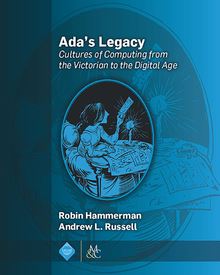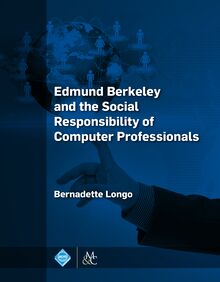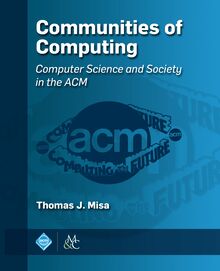-
 Univers
Univers
-
 Ebooks
Ebooks
-
 Livres audio
Livres audio
-
 Presse
Presse
-
 Podcasts
Podcasts
-
 BD
BD
-
 Documents
Documents
-
- Cours
- Révisions
- Ressources pédagogiques
- Sciences de l’éducation
- Manuels scolaires
- Langues
- Travaux de classe
- Annales de BEP
- Etudes supérieures
- Maternelle et primaire
- Fiches de lecture
- Orientation scolaire
- Méthodologie
- Corrigés de devoir
- Annales d’examens et concours
- Annales du bac
- Annales du brevet
- Rapports de stage
La lecture à portée de main
Vous pourrez modifier la taille du texte de cet ouvrage
Découvre YouScribe en t'inscrivant gratuitement
Je m'inscrisEdmund Berkeley and the Social Responsibility of Computer Professionals , livre ebook
Découvre YouScribe en t'inscrivant gratuitement
Je m'inscrisEn savoir plus
Vous pourrez modifier la taille du texte de cet ouvrage
En savoir plus

Description
This biography of Edmund Berkeley, based on primary sources gathered over 15 years of archival research, provides a lens to understand social and political decisions surrounding early computer development, and the consequences of these decisions in our 21st century lives.
Table of Contents: Modern Methods of Thinking, 1927–1941 / Navy Assignment at the Harvard Computation Lab, 1944–1946 / Establishing Open Communication Channels for Technology Development, 1945–1948 / Robots and Giant Brains, 1942–1961 / National Security Investigations, 1948–1955 / Engineering Peace, 1948–1970 / A Denunciation of Killing Devices, 1952–1972 / The Remaking of Man, 1973–1987 / Bibliography / Author’s Biography
Sujets
Informations
| Publié par | Association for Computing Machinery and Morgan & Claypool Publishers |
| Date de parution | 01 septembre 2015 |
| Nombre de lectures | 0 |
| EAN13 | 9781970001389 |
| Langue | English |
Informations légales : prix de location à la page 0,2450€. Cette information est donnée uniquement à titre indicatif conformément à la législation en vigueur.
Extrait
Edmund Berkeley and the Social Responsibility of Computer Professionals
ACM Books
Editor in Chief
M. Tamer zsu, University of Waterloo
ACM Books is a new series of high-quality books for the computer science community, published by ACM in collaboration with Morgan Claypool Publishers. ACM Books publications are widely distributed in both print and digital formats through booksellers and to libraries (and library consortia) and individual ACM members via the ACM Digital Library platform.
Edmund Berkeley and the Social Responsibility of Computer Professionals
Bernadette Longo, New Jersey Institute of Technology
2015
The VR Book: Perception and Interaction Design for Virtual Reality
Jason Jerald, NextGen Interactions
2015
Candidate Multilinear Maps
Sanjam Garg, University of California, Berkeley
2015
Smarter than Their Machines: Oral Histories of Pioneers in Interactive Computing
John Cullinane, Northeastern University; Mossavar-Rahmani Center for Business and Government, John F. Kennedy School of Government, Harvard University
2015
A Framework for Scientific Discovery through Video Games
Seth Cooper, University of Washington
2014
Trust Extension as a Mechanism for Secure Code Execution on Commodity Computers
Bryan Jeffrey Parno, Microsoft Research
2014
Embracing Interference in Wireless Systems
Shyamnath Gollakota, University of Washington
2014
Edmund Berkeley and the Social Responsibility of Computer Professionals
Bernadette Longo
New Jersey Institute of Technology
ACM Books 6
Copyright 2015 by the Association for Computing Machinery
and Morgan Claypool Publishers
All rights reserved. No part of this publication may be reproduced, stored in a retrieval system, or transmitted in any form or by any means-electronic, mechanical, photocopy, recording, or any other except for brief quotations in printed reviews-without the prior permission of the publisher.
Designations used by companies to distinguish their products are often claimed as trademarks or registered trademarks. In all instances in which Morgan Claypool is aware of a claim, the product names appear in initial capital or all capital letters. Readers, however, should contact the appropriate companies for more complete information regarding trademarks and registration.
Edmund Berkeley and the Social Responsibility of Computer Professionals
Bernadette Longo
books.acm.org
www.morganclaypool.com
ISBN: 978-1-97000-139-6 hardcover
ISBN: 978-1-97000-136-5 paperback
ISBN: 978-1-97000-127-2 ebook
ISBN: 978-1-62705-138-9 ePub
Series ISSN: 2374-6769 print 2374-6777 electronic
DOIs: 10.1145/2787754 Book
10.1145/2787754.2787755 Preface
10.1145/2787754.2787756 Introduction
10.1145/2787754.2787757 Chapter 1
10.1145/2787754.2787758 Chapter 2
10.1145/2787754.2787759 Chapter 3
10.1145/2787754.2787760 Chapter 4
10.1145/2787754.2787761 Chapter 5
10.1145/2787754.2787762 Chapter 6
10.1145/2787754.2787763 Chapter 7
10.1145/2787754.2787764 Chapter 8
10.1145/2787754.2787765 Bibliography
A publication in the ACM Books series, 6
Editor in Chief: M. Tamer zsu, University of Waterloo
Area Editor: Thomas J. Misa, University of Minnesota
First Edition
10 9 8 7 6 5 4 3 2 1
Contents
Preface
Introduction: A Struggle of Ideas
With the Perspective of Time
The Myth of Autonomy
Chapter 1 Modern Methods of Thinking, 1927-1941
A Modern Method of Thinking
Becoming an Insurance Actuary and a Husband
Applications of Symbolic Logic in the Insurance Industry
Chapter 2 Navy Assignment at the Harvard Computation Lab, 1944-1946
Joining Aiken s Crew
Conflict inside the Harvard Lab
Chapter 3 Establishing Open Communication Channels for Technology Development, 1945-1948
Public-Private Partnerships
Prudential Explores Electronic Computers
Technology Development, Communication, and Public Policy
Opening a Professional Association for Computer People
Future Catastrophe Hazards
Chapter 4 Robots and Giant Brains , 1942-1961
Problems of Language and Intelligence
Speaking of Machines as Human
Bringing Giant Brains to the People
Computing on a Small Scale
A Preview of the Robot Age
Chapter 5 National Security Investigations, 1948-1955
Fighting the Communist Threat at Home
The Rosenberg Case
Defense Against Unnamed Sources
Questions of Constitutional Rights
The Oppenheimer Case
Chapter 6 Engineering Peace, 1948-1970
Berkeley Enterprises, Inc.
The Dawn of the Computer Age
Engineering Weapons
Total War and Works of Peace
Nuclear Disarmament and Communist Infiltration
Sharing Information before the Internet
Chapter 7 A Denunciation of Killing Devices, 1952-1972
Using Computers for Peaceful Purposes
The Conscience of the Computer Industry
Chapter 8 The Remaking of Man, 1973-1987
Taking Stock of a Life
Bibliography
Author s Biography
Preface
The idea for this book began fifteen years ago with a question: How has the language we use to describe computers influenced what we believe are (im)possible relationships between humans and these machines? As I considered this question further, I focused on metaphors that people used to describe computers as this technology moved from military to civilian applications in the United States after World War II. At this initial stage of the project, Peggy Kidwell 1 was instrumental in suggesting relevant materials at the National Museum of American History Archive Center, as well as in the Smithsonian Institution archives. With her help, I received Smithsonian Institution travel funding and a Lemelson Center Fellowship to support this project as it took shape around the metaphors of robot and brain. Peggy s intellectual generosity and support at this early stage of the project gave me confidence that my research question and direction were important enough to seriously pursue.
Once it became clear that the metaphors of mechanical brain and robot brain had been instrumental in shaping our understanding of human-computer relations, it was not long before Steve Lubar 2 suggested that I look into the work of Edmund Callis Berkeley, who had published the book Giant Brains or Machines That Think . He suggested that perhaps it was time for someone to write a biography of Edmund Berkeley; I considered it. I heard that Paul Ceruzzi 3 had met Berkeley and had seen Squee the robot squirrel in person. So I asked Paul if we could talk about this idea of a Berkeley biography. Paul was also encouraging; I decided to take on the challenge of writing this book.
As I wrestled with the decision to write this book, I also talked with David Alan Grier 4 about the idea. He was generous with his support and knowledge about Berkeley, the insurance industry, and the cultural context surrounding computer development after World War II. In the many years between my decision to write a biography and the completion of this book, I am sure that Peggy, Paul, Steve, and David had given up hope that I would ever finish it. I dedicate this completed book to them and thank them for their early support that convinced me of this project s importance.
After deciding to write this biography, the next step was to contact the Charles Babbage Institute (CBI) at the University of Minnesota where Berkeley s papers are archived. My initial CBI contact was Elisabeth Kaplan, 5 whose enthusiasm for this project was combined with her knowledge of the archive s extensive materials for research. Beth explained the provenance of the Berkeley materials, which gave me an initial sense of my subject s character and opened the door to many, many hours of time travel through Berkeley s life.
In my pursuit of information about Edmund Berkeley, I visited schools where he was a student and met some extraordinarily helpful people along the way. Berkeley s early schooling took place at St. Bernard s School at 111 East 60th Street in New York City. Virginia Tracy 6 and other staff members there showed me archival documents so I could get an understanding of the breadth of humanistic, scientific, and artistic studies that Berkeley experienced as a child. From St. Bernard s, Berkeley continued his education at Phillips Exeter Academy in New Hampshire, where I was welcomed by Academy Archivist Edouard Desrochers 7 who generously provided materials from Berkeley s years there (1923-1925). Not only did Mr. Desrochers find copies of the Academy s monthly newsletter to help me understand the context of Berkeley s studies, he also found a diary Berkeley kept while at school. Although material from the diary does not appear directly in this biography, the depth of understanding that I gained from Berkeley s teenaged thoughts certainly informed my portrayal of his character.
In the fall of 1926, Berkeley entered Harvard University as a mathematics major. In the fall of 2003, I visited the Harvard University Archives to look into materials relating to mathematics instruction during Berkeley s years there. The Harvard University archivists not only provided the materials I thought I wanted to see, they also found alumni documents containing periodic reports written by Berkeley himself. My time at the Harvard University Archive proved to be extremely fruitful because of the interest and initiative of the staff there.
Throughout the fifteen years I worked on this biography, I have benefited greatly from my collaborations and discussions with talented librarians, archivists, and fellow researchers. It was during one of those discussions at the Archive Center at the National Museum of American History when Archivist Alison Oswald 8 and her colleagues suggested that I request Edmund Berkeley s FBI file under the Freedom of Information Act. Although it took some time to receive this file, the material contained in it gave me an appreciation for the importance of the political context relating to Berkeley s work. The suggestion to request Berkeley s FBI file turned out to be a pivotal decision for th
-
 Univers
Univers
-
 Ebooks
Ebooks
-
 Livres audio
Livres audio
-
 Presse
Presse
-
 Podcasts
Podcasts
-
 BD
BD
-
 Documents
Documents
-
Jeunesse
-
Littérature
-
Ressources professionnelles
-
Santé et bien-être
-
Savoirs
-
Education
-
Loisirs et hobbies
-
Art, musique et cinéma
-
Actualité et débat de société
-
Jeunesse
-
Littérature
-
Ressources professionnelles
-
Santé et bien-être
-
Savoirs
-
Education
-
Loisirs et hobbies
-
Art, musique et cinéma
-
Actualité et débat de société
-
Actualités
-
Lifestyle
-
Presse jeunesse
-
Presse professionnelle
-
Pratique
-
Presse sportive
-
Presse internationale
-
Culture & Médias
-
Action et Aventures
-
Science-fiction et Fantasy
-
Société
-
Jeunesse
-
Littérature
-
Ressources professionnelles
-
Santé et bien-être
-
Savoirs
-
Education
-
Loisirs et hobbies
-
Art, musique et cinéma
-
Actualité et débat de société
- Cours
- Révisions
- Ressources pédagogiques
- Sciences de l’éducation
- Manuels scolaires
- Langues
- Travaux de classe
- Annales de BEP
- Etudes supérieures
- Maternelle et primaire
- Fiches de lecture
- Orientation scolaire
- Méthodologie
- Corrigés de devoir
- Annales d’examens et concours
- Annales du bac
- Annales du brevet
- Rapports de stage




















